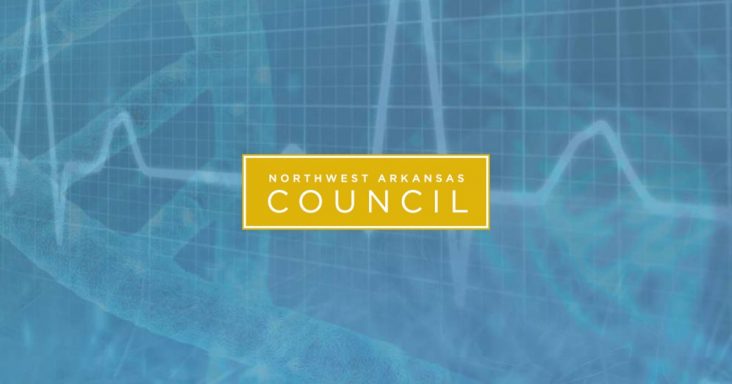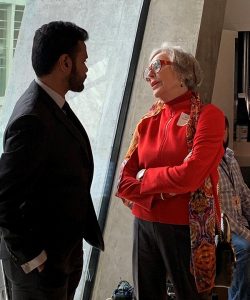Northwest Arkansas Council hones in on growing healthcare sector
by January 17, 2019 4:20 pm 1,408 views

Northwest Arkansas is still a long way from becoming a healthcare destination on par with peer metro areas of Austin, Texas, Durham-Chapel Hill, N.C., or Madison, Wisc. according to a new study released by the Northwest Arkansas Council at its winter meeting in Bentonville on Thursday (Jan. 17.)
The report indicates the healthcare sector in Northwest Arkansas is valued at $2.7 billion in annual economic output, but the region trails six peer metros also evaluated in the report: Austin, Boise, Des Moines, Durham-Chapel Hill, Evansville, Ind., Madison and Spokane, Wash.
A PDF of the report can be found here.
Paul Umbach, founder and senior principal of Pennsylvania-based Tripp Umbach, a national consulting firm with expertise in community health needs and healthcare economic impact, completed the analysis on behalf of the council. He gave the region the grade of “C” as a healthcare destination. He said the region is strong, but there is plenty of work to accomplish.
“This region is average, just like lots of other metros that haven’t really worked toward growing their healthcare sectors,” Umbach said. “Northwest Arkansas has exceptional leadership and resources to draw from and raising that grade from a ‘C’ to an ‘A’ is doable. There are regions who are a ‘C’ and they will always be a ‘C,’ because they do not have the leadership or vision and resources of Northwest Arkansas.”
Umbach, who is based in Kansas City, Mo., said the peer metros in the report who excel at being a healthcare destination, such as Durham-Chapel Hill or Madison, have two things in common — they have a regional group which sets healthcare goals and works toward meeting them to help grow the sector, and they have a common vision of being a healthcare destination. He said both elements are crucial to reaching the healthcare destination status by 2040.
Ross DeVol, an economist with the Walton Family Foundation, said the Northwest Arkansas Council is creating a working group to focus on healthcare as a destination. All healthcare providers in the region have signed on to be part of the special committee that will set goals and then work on achieving them. Umbach said the work of the group will go a long way to propelling the region toward a higher grade in overall healthcare.
DeVol said the region is losing $950 million annually on out-migration for specialty care to healthcare destinations like M.D. Anderson, the Mayo Clinic or Cleveland Clinic. At the same time, the region is rich in primary care access, ranking higher than Austin and the national average.
But people are not traveling to Northwest Arkansas for primary care, so that’s a resource that serves the residents well, but is not to be exported. DeVol said if the region doesn’t work toward adding specialty care and additional healthcare services, Northwest Arkansas will stand to lose $1.2 billion a year by 2030 on out-migration. DeVol said if the region can add more specialty care in the areas of cardiology and oncology by 2030, the positive impact to Northwest Arkansas would be $1.2 billion a year. He said that could balloon to $2 billion annually by 2040.

Eric Pianalto, president of Mercy Hospital in Rogers, said the healthcare working group was assembled by the council last year and he’s excited to be part of the initiative. He said the region’s recent investments in expanding primary care access and quality have set the stage for the next growth phase. He said until recently the region didn’t have the critical mass to support specialty physicians. At roughly 525,000 people, Northwest Arkansas is larger than peer groups Evansville and Durham-Chapel Hill, both of which report much larger healthcare sectors in their economies.
The report found healthcare jobs in Northwest Arkansas represent about 7% of the total employment. That compares to 11% in Evansville and 17% in Durham-Chapel Hill. One critical element lacking in the region besides specialty care is a medical school and robust research and development segment for biosciences. DeVol said the lack of a medical school or higher education for specialty medical training does hinder the region. He said the council will continue to research ways to combat the challenge, pulling all the levers at its disposal.
Umbach said he’s been part of the planning of more than 50 medical schools over the years. He said there is room for a medical school that follows outcome-based healthcare and focuses on healthy lifestyles and ushers in the latest technology with a research component. He said just 5% of the medical schools in the country offer research as a key curriculum component.
Umbach said that new model medical school has not yet been built and if Northwest Arkansas doesn’t do it, some other region will.
DeVol said the council will also look at other ways to expand residency programs and expand the slots in the schools already serving the region. The report recommends 200 additional residency positions are needed in Northwest Arkansas.
The report states 300 medical students will graduate within 70 miles of Springdale by 2022 from medical programs in the following cities: Fort Smith, Joplin and Tahlequah, Okla.
“Northwest Arkansas must either catch-up or lose ground to competing regions as it joins the nation’s largest 100 metropolitan areas in 2019,” the report states.
Umbach said a renewed focus on healthcare as a destination and setting up the separate working group within the council will lay the groundwork for the transformation that could take shape over the next 20 years. While 2040 seems like a long way off, he reminded the audience it’s not much further than 2010, which doesn’t seem like long ago.
“This region has a very strong platform to build upon, with the foundational primary care base — high quality and low cost of local primary care — in addition to having one of the healthiest populations in the country. I have watched this region over time and continue to be impressed with its accomplishments,” Umbach said.
Also at the winter meeting, Scott Van Laningham was named an honorary lifetime member of the Northwest Arkansas Council, joining the company of former President Bill Clinton, Alice Walton, the late U.S. Rep. John Paul Hammerschmidt, and Uvalde Lindsey. Van Laningham recently retired as director of the Northwest Arkansas Regional Airport and was instrumental to the airport being built and its growth. One of the first tasks the Northwest Arkansas Council undertook upon its founding in 1990 was getting a regional airport in Highfill to serve all of Northwest Arkansas.
“I have spent many nights on my patio pondering how the airport could keep up with this growing region and what it would take to get a major low-cost carrier to XNA. I now pass that baton to Aaron,” Van Laningham said. Aaron Burkes was named Van Laningham’s successor in September.
